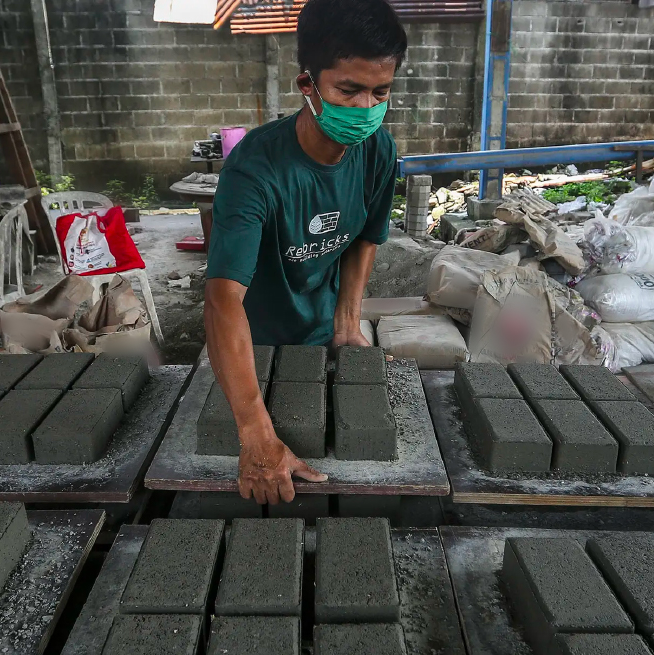Clean Cities, Blue Ocean Indonesia: From Ocean Pollution to Lasting Solutions
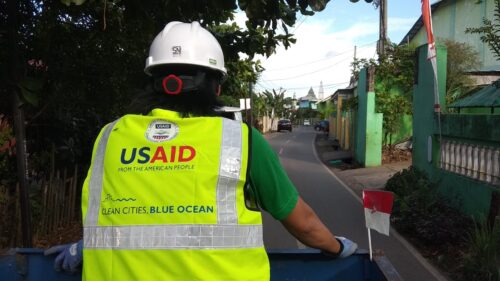
Indonesia, the world’s largest archipelagic country with over 270 million people, is renowned for its prosperous seas, vital mangroves, and over 17,000 diverse islands. However, like many countries around the world, its waste management infrastructure is struggling to keep pace with rapid urbanization and escalating plastic pollution, threatening the country’s treasured biodiversity. By 2025, 68 percent of the population is expected to live in urban areas, where only about half of the waste generated is collected and only 14 percent of the collected waste is recycled, with the remainder left untreated, leading to negative consequences for human health and the environment₁. Addressing these challenges is crucial to protecting Indonesia’s biodiversity and ensuring sustainable growth.
From 2020 to 2024, USAID’s Clean Cities, Blue Ocean program partnered with the Government of Indonesia to reduce land-based sources of ocean plastic pollution. The program engaged with three cities in Indonesia to build local government capacity and pilot improved waste management solutions with the public and private sector. Through this work, Clean Cities, Blue Ocean safely managed over 6.8 million metric tons of waste, preventing over 1.1 million metric tons of plastic and other low-value waste from leaking into the environment. USAID’s intervention has improved solid waste services and programs for nearly 3.6 million Indonesians.
In addition to these impacts, the Government of Indonesia and other local partners have embraced and begun to institutionalize the program’s approach across the country–demonstrating how USAID’s support can lead to scalable, lasting, and sustainable change at the local and national levels.
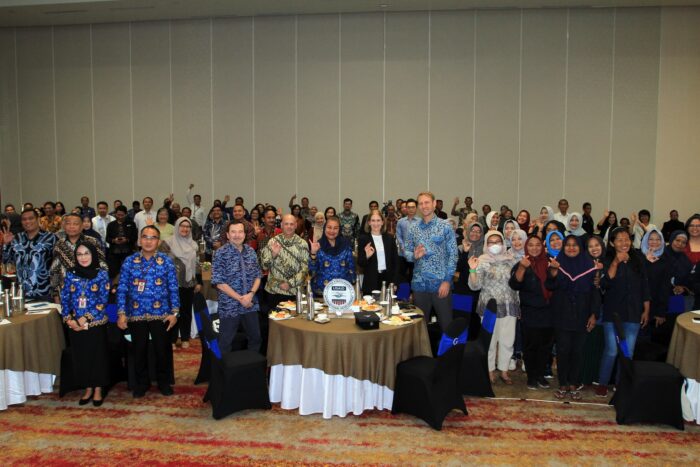
As Clean Cities, Blue Ocean celebrates the completion of its work in Indonesia, we’re taking a closer look at the program’s lasting impact and continuing legacy at the national level and across program engagement sites in the cities of Semarang, Makassar, and Ambon.
Institutionalizing Data-Driven, Participatory Solid Waste Management
In Makassar and Ambon, Clean Cities, Blue Ocean supported the local governments to develop Solid Waste Management (SWM) Master Plans, which outline both short- and long-term strategies to meet the waste management needs of the community. In these cities, the program led an integrated planning process, engaging key stakeholders, civil society organizations, and universities– assessing all aspects of the existing waste systems—institutional, social, financial, technical, and environmental factors—for more effective, sustainable waste management. The plans were adopted at the local level, in each city, and are in place today. At the national level, Indonesia’s Ministry of National Development Planning (Bappenas) also acknowledged Clean Cities, Blue Ocean’s approach, indicating its potential to be scaled and replicated to develop SWM Master Plans in other cities across Indonesia.
Adopting a New Approach to Community Social and Behavioral Change
Across Indonesia, Sanitasi Total Berbasis Masyarakat (STBM), which translates to Community-Based Total Sanitation and is an approach used to promote five sanitation issues (or “pillars”), including solid waste management. In its engagement sites, Clean Cities, Blue Ocean piloted a new approach, adapting Indonesia’s STBM to better align with Indonesian culture and the program’s research findings—rewarding positive behaviors instead of shaming negative ones. With the Ministry of Health and local Health Offices, the program trained 120 local public health workers in this approach across the three cities. After the trainers engaged with the community, residents responded positively. In Makassar, the community committed to segregate their waste, pay an SWM fee, and contribute to a better SWM system in their community.
At the national level, Clean Cities, Blue Ocean documented its approach by developing technical guidelines to inform Indonesia’s national STBM plan. The guidance aimed to create sustainable improvements by encouraging communities to take ownership of their waste reduction and recycling behaviors. As a result, Indonesia’s Ministry of Health adopted Clean Cities, Blue Ocean’s technical guidance, to be implemented across all cities nationwide.
Clean Cities, Blue Ocean sets a great example of collaboration with both the national and local governments. I’ve learned a lot from the program. This is the first waste project overseen by Bappenas. Clean Cities, Blue Ocean is the main catalyst for implementing STBM Pillar 4 (solid waste management), which was just an idea but is now being put into action. Waste management factors are few, but the problem is still significant. Waste issues in the National Medium-Term Development Plan are game changers, becoming a strategic national issue. This is a transformative effort in national strategic planning. Indonesia cannot progress without addressing waste.
– Mrs. Nur Aisyah Nasution, Coordinator for Water Sanitation, Solid Waste, and Health, BAPPENAS
Advancing Circular Economies and Women’s Empowerment
In Semarang, Clean Cities, Blue Ocean’s Women in Waste’s Economic Empowerment (WWEE) activity equipped women waste collectors with the tools and support they need to succeed in the waste sector. Through tailored business and empowerment training, mentorship, and funding opportunities, women were supported in building sustainable enterprises and making a lasting difference in their communities. Through USAID, over 200 women received training to launch or expand their waste collection businesses, over 75 women-led waste enterprises were supported to establish or expand their businesses, and over $115,000 of government support was mobilized to support these enterprises. Due to the success and impact of WWEE, Indonesia’s Ministry of Environment and Forestry has committed to scale the WWEE model nationwide. Using its own resources, the government began rolling out WWEE’s Basic Business and Empowerment Skills Training (BBEST) in May 2024, and trained 23 waste banks in Depok, Bogor, and Jakarta in their first months. Further plans to reach approximately 70 waste banks across 16 cities are underway.
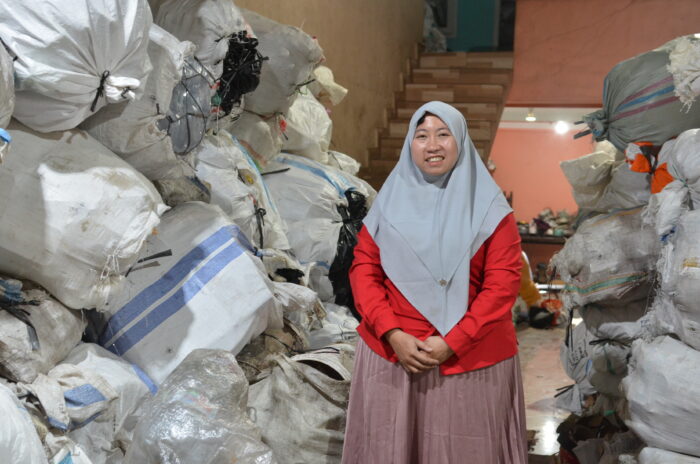
Building National Infrastructure for Recycling and Circular Economies, with the Private Sector
In addition to governmental institutionalization of Clean Cities, Blue Ocean’s approach, private sector partners are also scaling program-supported models to aggregate and process plastics, bolstering the country’s ability to create a strong national market for recyclables. In Semarang and Makassar, for example, Clean Cities, Blue Ocean’s partners Prevented Ocean Plastic Southeast Asia (POPSEA) and its subsidiary, Prevented Ocean Plastic Indonesia (POPI), continue to expand recycling infrastructure in Indonesia–strengthening and scaling beyond their new USAID-supported plastic aggregation and collection centers in Semarang and Makassar.
The Semarang center, now a regional hub, processes 500 metric tons of plastic monthly, equivalent to over 54 million bottles, while the Makassar center handles 400 metric tons per month. Both continue to focus on inclusivity and better working conditions for informal waste collectors, particularly women, providing training, fair pricing, and safe sorting facilities. USAID’s support for these centers has helped POPI advance its “25 by 25 initiative”—which aims to open 25 collection centers in coastal areas across the world by 2025. POPI, so far, has established seven centers–the most recent is a second facility in Makassar that opened in June 2024. The high-capacity recycled plastic collection center can process 500 tons of plastic waste per month and is anticipated to create 50 local jobs.
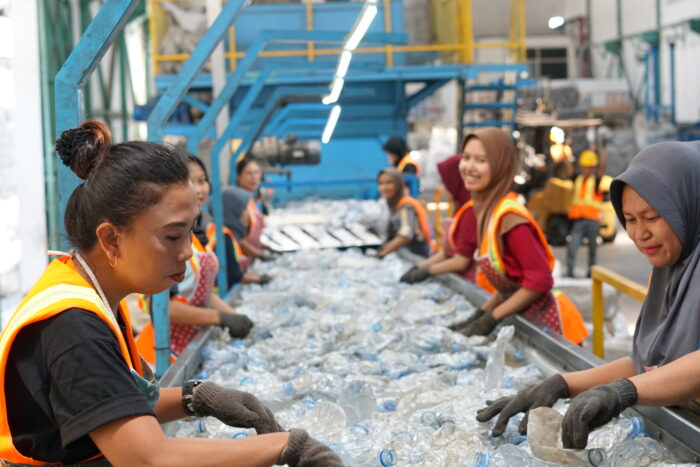
In Ambon, part of Indonesia’s Maluku Islands, USAID’s support has helped establish more economically feasible options for managing the waste. Previously, few options existed for the relatively remote island to recycle waste, with less than two percent of waste being recycled. Through a Clean Cities, Blue Ocean grant, Milion Limbah Indonesia has enhanced plastic recycling, particularly for low-value plastics, by establishing the city’s first recycling center in Hutumuri and several collection centers in the city center. This network has improved logistics, created green jobs, and enhanced conditions for waste and recycling workers. From May to December 2023, Milion Limbah Ambon recovered and recycled over 746 metric tons of plastic— the equivalent of roughly 80.5 million plastic water bottles. Milion Limbah Ambon will continue implementing new recycling processes, such as pelletizing, to improve the quality and value of collected plastics.
In Semarang, Clean Cities, Blue Ocean’s partner, Rebricks’ impact also continues to grow. Rebricks was founded in 2018 in Jakarta as a green construction material start-up to address the country’s urban growth and increasing waste production. In 2019, the company developed a new brick product using single-use plastic waste that meets industry standards. In 2023, USAID awarded a grant to the company, enabling them to expand operations to Semarang. Here, the innovative company is now transforming low-value plastics, such as multi-layered plastics, soft plastic packaging, and plastic bags that typically leak into the environment as there is no market for them, into recycled building materials. Rebricks collects the plastic waste through individuals’ donations, purchases waste from businesses, and offtakes from waste banks. Once collected, a single machine is used to shred and mold the plastic, avoiding any polluting, burning, or melting processes. Finally, the molded plastic is mixed with natural products, such as stone and ash, and sealed to prevent any microplastics from leaking into the environment. The bricks can quickly be produced, are affordable, and have a potential lifespan of over 20 years.
Although Clean Cities, Blue Oceans has exited Indonesia, Rebricks’ work continues, having already prevented 8.8 MT of plastics—the equivalent to nearly one million plastic bottles—from reaching the ocean.
